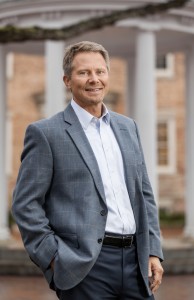
Kevin Guskiewicz (photo by Kevin Seifert Photography)
In late August, Carolina heralded the arrival of 4,254 first-year students at an evening convocation in Carmichael Arena. A brief shower during the ceremony left a spectacular rainbow for all of us exiting the building to enjoy. I snapped a photo and posted it on Twitter (yes, I am on Twitter now — at @unccollegedean). To me, it symbolized the great things ahead for our newest Tar Heels.
A few short weeks later, the College of Arts and Sciences formally launched a major new initiative, “Carolina’s Human Heart: Living the Arts and Humanities,” to which most of this issue is devoted. Last spring, I asked Terry Rhodes, senior associate dean for fine arts and humanities, to spearhead this effort because I wanted to highlight the important work that our faculty, staff and students across the College are conducting on topics that add meaning and value to our lives, that provide historical context, that help us think creatively and approach big challenges in bold new ways. Those areas are reflected in the six subject themes of the initiative: social justice, an enlightened citizenry, tolerance and understanding, global engagement, food and the environment, and storytelling.
In all, we have nearly two dozen academic departments and curricula and 10 interdisciplinary centers in the College devoted to the fine arts, humanities and qualitative social sciences (areas such as history, archaeology and anthropology that fall under the humanities’ broad canopy).
Of course, these units are not alone in taking on issues of great importance. Our faculty in the natural sciences are approaching many of the same topics from different angles. I believe there is true strength and synergy when the arts and sciences work together to tackle complicated, multifaceted problems. That’s why I’m working to create more interdisciplinary opportunities in the College and bringing fresh approaches to team teaching, new courses and research endeavors.
Last spring, when the College brought the eloquent Fareed Zakaria to campus to talk about the value of a liberal arts education — to a packed auditorium, I am proud to report — he told the audience, “Science alone cannot suffice to comprise the broad, deep education that the United States has always been very good at. We teach people how to think, and that may turn out to be a more successful skill at succeeding in life.”
“Carolina’s Human Heart” is a yearlong initiative devoted to continuing that conversation.

